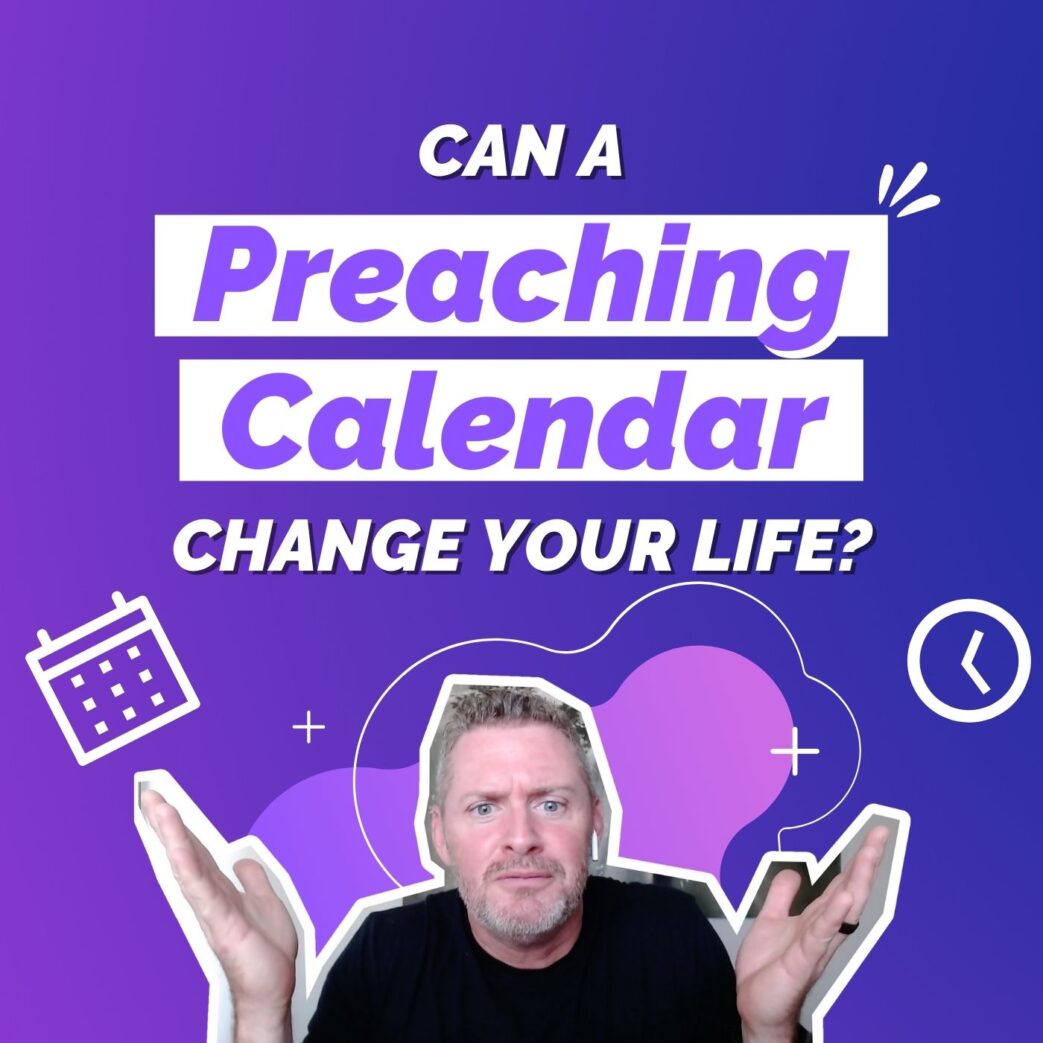Do you really need a preaching calendar? Some would argue that preaching calendars are impractical, constricting, and make services feel too mechanical.
But if you haven’t tried a calendar yet, you need to give it a fair shot before making your final judgment call. While it may sound like a bold statement, we do think that a preaching calendar can transform a pastor’s life for the better.
In addition, we think that if you fully embrace the planning process, you’re more likely to avoid these three preaching mistakes and instead reap four tremendous benefits. Read on to learn more!
Table of contents
Three Pitfalls You Can Avoid With a Preaching Calendar
It’s somewhat a myth that you can get up and deliver a powerful Holy Spirit-inspired extemporaneous sermon week after week. Instead, more often than not, preaching feels like hard work!
Like any vocation you’re called to, preaching is about stewarding what you’ve been entrusted with and having a spirit of excellence in all you do – which is challenging if you don’t have time to prepare.
You also have to remember that the preaching calendar isn’t just about your personal work style preferences. A well-planned calendar ultimately serves the members you’re called to teach, shepherd, and lead.
If you don’t have a preaching calendar, here are a few mistakes or roadblocks you may encounter.
Redundancy or Gaps
If you don’t put some time into the planning process, you may always fall back on the same sermons, points, and illustrations. You may forget what you preached seven months ago, but there are people in your congregation who will recognize that you’re preaching the same marriage sermon every February.
This also leads to gaps in knowledge and growth for your congregation. For example, they may hear primarily about specific topics or books of the Bible (which happen to be your favorites) but lack a well-rounded knowledge of the scriptures, theology, and life topics.
Stress
As soon as you get done with one Sunday, there’s another one coming! While some seasons you may be able to get by week-to-week, others may have unexpected crises or heavier workloads.
Last-minute prep usually leads to a less than stellar message and causes you a ton of stress.
And week-to-week sermon preparation can also create tremendous stress for the team members who need your sermon notes for service elements.
Superficial Preparation
Without a plan, you may find that you don’t have enough time to generate the breadth and depth of ideas that can make a sermon original, inspiring, and impactful.
Additionally, lacking clear direction means that opportunities and resources are likely to be missed along the way. Think about the stories, books, facts, and research you may come across over a year and dismiss that could have been used in a sermon!
When you know what you’re preaching 3, 6, and 9 months out, you’re aware of various topics you need to research and reflect on. So then, you can gather more golden nuggets along the way.
Four Major Benefits of a Preaching Calendar
You can experience many benefits when you devote time to developing a preaching calendar. If you aren’t currently planning very far in advance, start with three months and then gradually back up to create a longer calendar.
1. Taking Time for Prayer
Even though planning doesn’t initially sound spiritual, we’d argue it allows you to be more spiritual. More advance time for planning means more time for prayer.
Blocking out the calendar for a sermon planning retreat is an excellent idea. This allows you to get away from the day-to-day distractions and focus on what God is saying.
2. Getting Input From the Right People
When you involve other people in the preaching calendar planning process, you get the best input and insight from those who know you and your members.
Feedback can come from your mentors, senior staff, or a group of leaders from your church who help with brainstorming and planning sermon topics.
Additionally, getting input from others will also help ensure your messages are well-rounded and will meet the needs of all your church members.
3. Syncing With the Seasons
Certain times of year see higher attendance than others. Plus, people expect to hear about specific topics during certain times like holidays.
When planning ahead, you have time to get creative to capitalize on peoples’ interests.
Planning around the seasons also helps you prepare for special events, conferences, or churchwide series. The sermon series preceding and following these events can build momentum and provide additional study tools and follow-up.
4. Personal Wellbeing and Balance
A preaching calendar helps promote your personal well-being and work-life balance. Too many pastors are getting burned out, and we don’t want to see that happen to anyone!
Knowing what you’re preaching months in advance allows for a more relaxed and stress-free week as you gear up for Sunday. You’ll have time to focus on your family and take care of yourself.
Additionally, a preaching calendar makes it easier to pass the baton and have other people step in and preach for you – and not cause them the stress of last-minute scrambling.
What’s Next?
If you don’t have a preaching calendar, we hope this has inspired you to start one! On the other hand, if you already have a preaching calendar, we hope this post has given you some new ideas to consider.
To get started, we encourage you to take three simple steps:
- Pray about your potential sermon series and topics.
- Brainstorm (check out 10 Do’s and Don’ts for Brainstorming Sermon Topic Ideas and 72 Sermon Series Ideas to Draw People In).
- Get the right people in a room with a calendar and start scheduling out sermon series!
What do you think? Do you currently use a preaching calendar, and what are your tips for best practices?
More About Your Preaching Calendar





